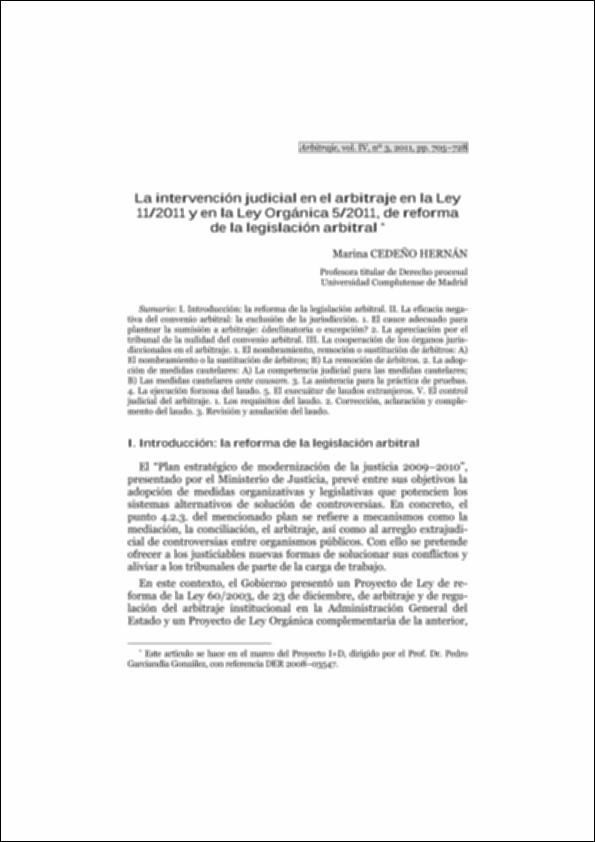Por favor, use este identificador para citar o enlazar este ítem:
http://hdl.handle.net/10637/13030La intervención judicial en el arbitraje en la Ley 11/2011 y en la Ley Orgánica 5/2011, de reforma de la legislación arbitral.
| Título : | La intervención judicial en el arbitraje en la Ley 11/2011 y en la Ley Orgánica 5/2011, de reforma de la legislación arbitral. |
| Autor : | Cedeño Hernán, Marina |
| Materias: | Arbitraje y jurisdicción.; Convenio arbitral.; Eficacia negativa.; Exclusión de la jurisdicción.; Medidas cautelares.; Ejecución forzosa del laudo.; Revisión y anulación del laudo.; Jurisdiction and Arbitration.; Arbitration agreement.; Negative effect of the arbitration agreement.; Exclusion of jurisdiction.; Enforcement of the Arbitral Award.; Provisional measures.; Revision and annulment and revision and annulment of arbitral award. |
| Resumen : | Las reformas del arbitraje efectuadas por la Ley 11/2011 y en la Ley Orgánica 5/2011 afectan a aspectos muy diversos de la institución arbitral. Tras la reforma el
laudo es firme desde que se dicta y, por tanto, tiene eficacia de cosa juzgada material y
frente a él pueden ejercitarse dos acciones de impugnación: la anulación o la revisión. La
Ley 11/2011 prevé otras reformas que afectan a la acción de anulación del laudo. La primera, y más relevante, se refiere a la competencia objetiva para conocer de esa acción que
corresponderá a la Sala de lo Civil y Penal del Tribunal Superior de Justicia del lugar
donde el laudo se hubiere dictado. Otras se centran en la expresa previsión de que el demandado acompañe a su contestación los documentos justificativos de su oposición; el
traslado de la contestación y de los documentos que la acompañan al actor para que pueda presentar documentos adicionales o proponer la práctica de nuevas pruebas; y la posibilidad de prescindir de la vista si las partes no lo han solicitado en sus escritos de demanda o contestación o si sólo se han aportado pruebas documentales y no hubieran sido
impugnados los documentos o si se hubieran aportado informes periciales que no necesiten ratificación. En esos casos, el tribunal dictará sentencia sin más trámites. The amendments that have been introduced in arbitration by means of the Law n. 11/2001 and the LO 5/2011 affect very different elements of the arbitral institution. After the reforms, the arbitral award is definitive from the moment it is issued. Therefore, it is res judicata and there are two possible actions to challenge it: annulment and revision. The Law n. 11/2001 introduces also some amendments concerning the annulment of the award. The first, and more relevant, concerns jurisdiction. Competence has shifted to the Tribunal Superior de Justicia –Chamber of Civil and Criminal matters (Sala de lo Civil y Penal) of the place where the award has been issued. Other reforms consist in the obligation of the defendant to provide documentary evidence of the reasons to challenge the award; the service of the response to the plaintiff, so that he may submit additional documents and propose new evidence; and the possibility of dispensing with the hearing when the parties have not requested it in their statements of claim or defense, and also if they just have provided documentary evidence and the documents have not been disputed, or they have provided expert reports that do not require ratification. In such cases, the court shall decide without further proceedings. |
| Descripción : | En: Arbitraje: revista de arbitraje comercial y de inversiones. eISSN. 2603-9281. vol. 4, n. 3, 2011, pp 705-728 |
| URI : | http://hdl.handle.net/10637/13030 |
| Derechos: | http://creativecommons.org/licenses/by-nc-nd/4.0/deed.es |
| Fecha de publicación : | 24-sep-2011 |
| Aparece en las colecciones: | 2011 Arbitraje nº 3 |
Los ítems de DSpace están protegidos por copyright, con todos los derechos reservados, a menos que se indique lo contrario.


